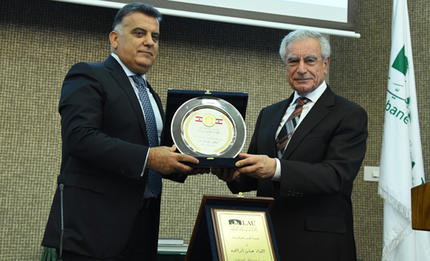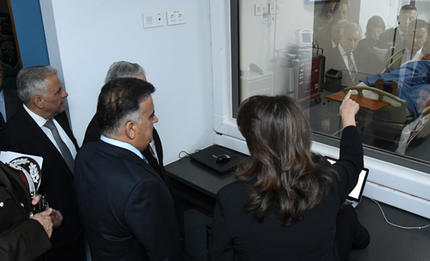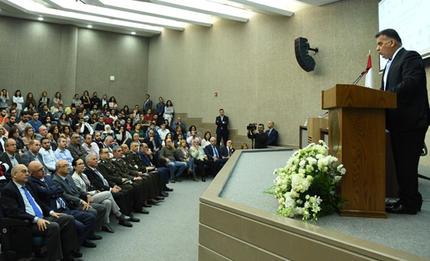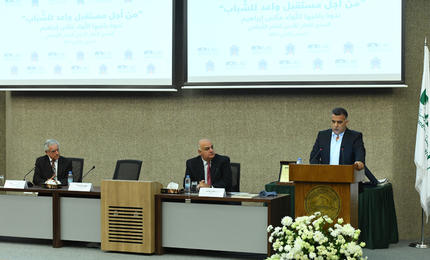Next elections a step “Toward a Promising Future for the Youth”
Major-General Abbas Ibrahim galvanizes students to participate in the decision-making that shapes their future and that of their country.

In an exchange of gifts, LAU President Joseph G. Jabbra presented Major-General Ibrahim with a shield in recognition of the strong ties between the two institutions.

Major-General Ibrahim and his delegation were given a tour of the campus, its schools and the Clinical Simulation Center by LAU President Joseph G. Jabbra and faculty members.

Addressing an audience composed of LAU faculty, staff, students, and a General Security delegation, Ibrahim recognized that “his generation had been governed by extenuating circumstances, as his predecessors had been unable to curtail the war or mitigate its consequences.”

Director General of General Security Major-General Abbas Ibrahim urged students to reach those who have the capacity and willpower to tackle social, economic and environmental issues by casting their votes in the next elections.
During a lecture and interactive session hosted by LAU on its Byblos Campus, Director General of General Security Major-General Abbas Ibrahim called on the students to “engage in the broadest process of democratic change in their respective cultural, social and political frameworks.” He urged them to reach those who have the capacity and willpower to tackle social, economic and environmental issues by casting their votes in the next elections.
The talk was held in the auditorium of the Gilbert and Rose-Marie Chagoury Health Sciences Center shortly after Major-General Ibrahim and his delegation were given a tour of the campus, its schools and laboratories by LAU President Joseph G. Jabbra and faculty members.
In his opening speech, Byblos Campus Dean of Students and Assistant Professor of Political Science and International Affairs, Makram Ouaiss thanked the major-general for accepting the university’s invitation to give the lecture, titled “Toward a Promising Future for the Youth.”
Following the national anthem, Jabbra praised the work of General Security in dismantling terrorist cells. He conveyed his students’ anticipation to meet a person in power, “who rises above crooked practices,” stressing that the university in turn bears a sense of responsibility toward its society and aims to give back by nurturing tomorrow’s leaders. Jabbra then presented Ibrahim with a shield in recognition of the strong ties between the two institutions, during an exchange of gifts.
Addressing an audience composed of LAU faculty, staff, students, and a General Security delegation, Ibrahim recognized that “his generation had been governed by extenuating circumstances, as his predecessors had been unable to curtail the war or mitigate its consequences.” Remarking that the fear the youth held for their country’s future stemmed from the lack of “strategic policies that adopted their cause and enabled their participation in a comprehensive economic system,” he urged government to ensure the integration of the new generation in the public and private sectors in order to stem the brain drain.
Silence, Ibrahim added, was the gravest threat to the youth and their future, while they were made “victims of a sectarian, partisan and divisive culture … and accepted their exclusion from political decision-making to which they had a right.” The answer was “to resist isolationism … and strive to build a Lebanon based on equality in citizenship and participation.”
During the Q&A session, a variety of topics were raised, ranging from the new electoral law to the refugee crisis. In response, Ibrahim said that, although the electoral system was not ideal, it was the best that could be achieved and may well pave the way to change. He made it clear that a model electoral process would be Lebanon as one district with equal representation, which would do away with sectarianism and religious differences.
On film censorship, he highlighted the fact that we lived in a divided confessional society, and that it was “the duty of General Security to deter dissent, and quell any threat to the security of the community as some people tended to react to the media with bigotry.”
Perhaps it was unavoidable that the discussion should have turned to the issue of refugees, which Ibrahim pointed out had placed an added burden on General Security as it has had to manage the influx and set up centers to facilitate processing the required paperwork. He hoped that, by the time he left the Directorate of the General Security, an online system would be in place.
On the national level, the greatest challenge in his opinion was to obstruct attempts to create a new terrorist movement in place of al-Nusra or ISIS that would destabilize and fragment the country.
“It was something to be proud of,” said senior student in marketing Elio Kassab of the talk, “as it encouraged us to take charge of our future and that of the country.”
Political Science and International Affairs senior Josiane Mattar was equally impressed by the major-general’s readiness to engage the students, adding that “the talk was very inspiring. It gave us hope that, in spite of all the corruption in the country, improvements were being made.”
More
Latest Stories
- Community Development Takes Root at Capstone Presentation Day
- LAU Athletes Return Victorious from Athens and Belgrade
- A New Initiative Toward Harnessing Digital Transformation
- A Cardiovascular Conference to Streamline National Expertise
- Aspiring Engineers Compete for Scholarships at LAU
- The School of Engineering Delivers Immersive Learning Experiences
- Consultants in the Making
- LAU Marks Rare Disease Day With a Call for Collaboration

